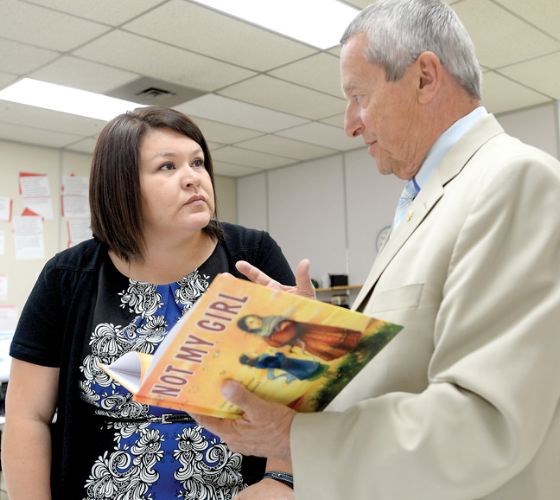Prince George and School District 57 is a leader in innovative programming, according to B.C.'s education minister, in part out of necessity.
"You've had declining enrolments so that brings a challenge," said Peter Fassbender before Monday's K-12 Innovation Forum in Prince George. "By the same token you've got partners in industry and business and other community agencies that are willing to step up and support the future, which is the kids.
"You see those partnerships coming together where education isn't expected to do it all on its own. There is that sense of cooperation."
Fassbender started the forum by acknowledging disagreement in the room on the direction of public education funding.
"Yes, funding is a challenge. I recognize that and the government recognizes that and there is disagreement on how much we should be doing and what more we should be doing."
In part he was addressing the opening comments of Grade 12 student Kyle Rowell, who kick-started that conversation in his speech, criticizing education funding and welcoming Fassbender with "slight discomfort" and in "good humour."
Fassbender addressed Rowell: "I need to tell him that the beauty of democracy is our ability to work in community, to work together," he said. "We don't always agree on the approaches but what we do agree on is why we're here."
The role of government is to "light the spark of innovation," Fassbender told the trustees, district and school representatives and community organizations that packed into the Coast Inn of the North ballroom.
After the forum, Fassbender was scheduled to meet with trustees, who have been repeatedly critical of funding. This year the district had a $3.3 million dollar deficit and pulled $698,000 from its surplus, a practice the board has said is not sustainable.
So what does Fassbender think will make the district sustainable?
"The reality is we have not cut education funding," said Fassbender in an interview before the forum.
"We've actually increased it. Yes, we've asked schools to look for administrative savings. We also have an initiative on shared services.
"We also recognize there are districts that have done more hard lifting than others and we're looking at our funding formulas and so on to ensure that we look at how education is funded both at the district level and at the provincial level."
When it comes to the district's surplus, Fassbender said, "I recognize that the money has been saved through hard work but in the meantime while we're still at this critical time in our economic platform we have to make sure we have every efficiency we can to be directed into the classroom for the benefit of the students."
Fassbender agreed that rural and northern communities require a different provincial strategy.
"Rural communities have different needs. They want the same outcomes for their students but things like technology, the access to high speed internet, all of the things that will help the students in rural communities get access, we're working on."
Improved technology was also his answer to help rural students get access to courses, like Chemistry 11, that might not be taught due to low enrolment. The changes to Adult Basic Education, which came into effect in May, mean students who graduate can no longer take these types of courses for free (unless they qualify for a grant).
"That's the beauty of where technology is going to take us," he said.
"That's why we're working on ensuring broadband is available in every community, every rural community."
When asked when those courses would be rolled out, Fassbender said the province was working on it.
At the forum, Fassbender told the crowd if educators expect him and his ministry to come up with all the solutions, "you're going to be disappointed because we can't do it out of Victoria."
Participants heard from the region's superintendents about programs that have worked, followed by a video featuring District 57's exploration programs, interactive online biology class and aboriginal programming at Nusdeh Yoh.
The programs are all aligned with the province's focus on personalized learning, an approach highlighted in the BC's Education Plan, launched in 2012. Prince George was the fifth innovative forum in the province.
"I'm a firm believer if we expect government to provide all the resources to get the job done it's not going to happen," he said.
"That's why we need companies, industry, businesses who have a vested interest in having young people trained and capable of moving into the workforce which will benefit those business and industry to be a partner with us."



